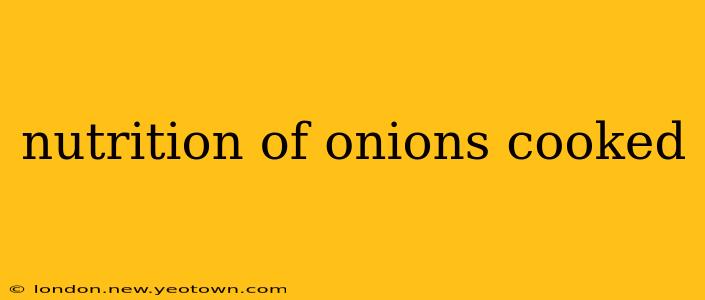Onions: those pungent, tear-inducing bulbs that add so much flavor to our dishes. But beyond their culinary magic, cooked onions hold a surprising nutritional punch. While many focus on the benefits of raw onions, the cooking process actually alters their nutritional profile in interesting ways, making them even more beneficial in some respects. Let's delve into the delicious world of cooked onion nutrition.
What Happens to Onions When They're Cooked?
The cooking process affects the nutritional content of onions in several key ways. Heat softens the onion's fibrous texture, making them easier to digest. It also changes the concentration of certain compounds. Some nutrients might be slightly reduced through heat exposure, but other beneficial compounds become more bioavailable – meaning your body can absorb them more easily.
Are Cooked Onions as Nutritious as Raw Onions?
This is a common question, and the answer is nuanced. While raw onions boast higher levels of certain vitamins like vitamin C, which is heat-sensitive, cooking onions enhances the bioavailability of other nutrients and creates new beneficial compounds. Essentially, both cooked and raw onions offer different nutritional benefits. It's not about one being "better," but rather understanding the unique advantages of each form.
What nutrients are boosted in cooked onions?
Cooking onions increases the levels of certain antioxidants, specifically quercetin. Quercetin is a powerful antioxidant linked to various health benefits, including reducing inflammation and protecting against chronic diseases. The heat breaks down some of the onion's cellular structures, making this quercetin more accessible for absorption.
Do cooked onions have fewer calories?
No significant calorie difference exists between raw and cooked onions. The caloric content remains relatively consistent regardless of preparation method.
Are cooked onions easier to digest?
Yes! The cooking process softens the onion's fiber, making them gentler on the digestive system. This is particularly beneficial for individuals with sensitive stomachs who might find raw onions difficult to digest.
Health Benefits of Cooked Onions
The nutritional benefits of cooked onions extend beyond just increased quercetin availability. Cooked onions offer a range of potential health benefits:
- Improved Heart Health: The antioxidants and anti-inflammatory properties of cooked onions may contribute to better heart health by reducing cholesterol levels and blood pressure.
- Enhanced Immune System: The vitamins and minerals in cooked onions support a healthy immune response.
- Reduced Inflammation: Quercetin's powerful anti-inflammatory effects can help combat chronic inflammation linked to various health problems.
- Improved Blood Sugar Control: Some studies suggest that onions may help regulate blood sugar levels.
How to Cook Onions to Maximize Their Nutritional Value
To retain the maximum nutritional value of onions when cooking, it's best to use gentle cooking methods. Steaming, sautéing, or adding them to stews and soups are excellent options. Avoid overcooking, as this can reduce the nutrient content. Adding onions towards the end of the cooking process can also help retain more of their beneficial compounds.
Are there any downsides to eating cooked onions?
While generally safe and healthy, some individuals might experience digestive discomfort from cooked onions, especially if consumed in large quantities. Also, individuals with specific allergies should exercise caution.
In conclusion, both raw and cooked onions offer valuable nutritional benefits. The cooking process doesn't diminish their overall nutritional value; instead, it transforms it, highlighting certain compounds and making them easier to digest. Incorporating cooked onions into your diet offers a delicious and nutritious way to boost your health. So, next time you're cooking, remember the surprising nutritional power hidden within those humble cooked onions.

